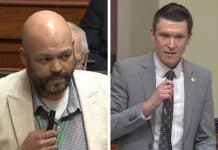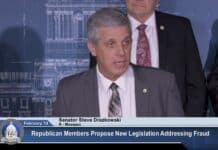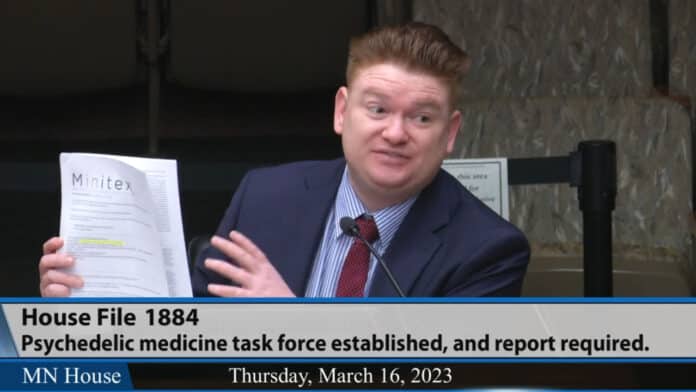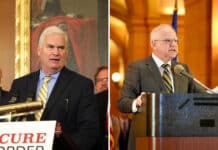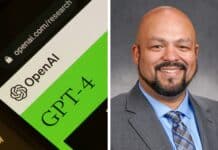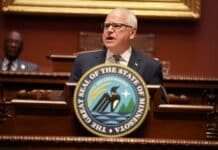First-term legislators Walter Hudson, R-Albertville, and Andy Smith, DFL-Rochester, didn’t find themselves on the same side of very many votes in the House of Representatives this session. But they did co-sponsor a bill that could put psychedelic drugs on a trajectory to become legal for medicinal use in mental health therapy.
The language of that bill, HF1884, ended up in an omnibus health and human services package that was signed last month by Gov. Tim Walz. And as a result, next month the state will form a new psychedelic medicine task force that will be charged with providing information and advice to the legislature on potential legalization of drugs like LSD, MDMA, psilocybin mushrooms for medicinal use in clinical mental health settings.
Republican and DFL leadership in both the House and the Senate will each get to pick one legislator from their respective caucuses. Other task force appointees will include: designees from the offices of governor and attorney general, the Minnesota Department of Health, state Board of Pharmacy, two members representing the Ojibwe and Dakota tribes, two veterans with treatment-resistant mental health conditions and a number of mental health experts. The task force will meet a number of times and complete two reports it will submit to the House and Senate before the start of the next two legislative sessions on the possibility of legalization of psychedelic medicine in Minnesota and a comprehensive plan for doing so.
Potential alternative to traditional methods of therapy
Smith who carried the legislation in the House presented the bill in a brief hearing before the Health Finance and Policy Committee in March. The DFLer, whose district includes much of the Mayo Clinic campus, expressed optimism that the mental health industry would soon be able to incorporate more psychedelics into treatment of individuals suffering from a number of issues such as post-traumatic stress disorder (PTSD), depression and anxiety, where more established therapies have offered limited results. He said he’d spoke with many Mayo Clinic professionals who support the bill.
“We have seen many, many studies across the medical community that show these drugs have incredible potential to help with various psychological disorders,” Smith said during a March 15 hearing on the legislation.
The bill made its way through the legislature as the recreational cannabis bill was inching closer to passing in both the House and the Senate, and as news media has chronicled a movement of military veterans who are pushing for legalization of more psychedelics for use in treating PTSD.
Rep. Walter Hudson, a Republican who opposed the recreational cannabis bill but signed onto the psychedelic medicine task force legislation, said he was approached by experts in the field about creation of the psychedelic medicine task force. After careful consideration, he offered to add his name as one of two Republicans among several DFL sponsors in the House.
“This wasn’t something I came into the legislative session with previous knowledge or opinion on,” Hudson said. “It was presented to me by subject matter experts, and at first, I thought, ‘Oh, that’s really cute, it doesn’t sound like something I’d be interested in.'”
But as Hudson learned more about the number of studies on the potential use of psychedelic medicine in mental health therapy, he saw the benefit of signing onto the legislation.
“There is tremendous therapeutic value in looking at psychedelic drugs in a very controlled setting to try to treat things such as PTSD, which a lot of our veterans and peace officers suffer from,” he said.
Another Republican legislator, Rep. Duane Quam, of Byron, also expressed support for the bill, with cautious advice he offered during a March 15 hearing on the bill.
“I think anytime we are looking at mainstreaming any drug or medication we should have a genomic component to make sure we try and understand what groups of people might be having a bad or adverse effect,” Quam said during the March hearing on the bill. “Anytime we do a type of study we look into expanding or changing classes of (drugs to be used for medicinal purposes) we need to really use the more cutting-edge science to make sure we avoid the unintended consequences.”
Leaders in the field pushed for task force
A handful of mental health professionals from around the Twin Cities submitted letters supporting the creation of the task force, including noted Optum Health founder Edward Bergmark, a longtime licensed psychologist.
“There is already strong research evidence that these substances can be used in safe and therapeutic contexts to provide treatment that is not available with our existing modalities,” Bergmark wrote in his testimony to legislators in support of the bill. “I urge you to allow the continued scientific exploration of these new approaches to healing. It is imperative that we move beyond today’s limited and often ineffective practices.”
Written testimony also came from a number of mental health professionals who specialize in utilization of psychedelic therapy on their patients, such as Kyle Ross, a clinical counselor and director of St. Paul-based Intero Psychedelic Therapy.
“Psychedelics offer the potential for experiencing powerful non-ordinary states of consciousness, which can allow individuals to access innate sources of healing in a manner that traditional talk therapy does not,” Ross wrote in his testimony supporting HF1884. Currently, ketamine is the only legal psychedelic available in Minnesota.
Ross, and other mental health professionals in the Twin Cities have utilized the drug with patients in a clinical setting. Ketamine has gained attention in the news in recent years for its controversial use by some law enforcement and paramedics as a powerful sedative for people in custody.
Ross described his use of ketamine with patients as a tool to assist the patient in moving through emotional states, along with a course of therapy sessions, to assist the patient in preparing for, and integrating the medicine experience into their lives, for long-term change.
While some may initially scoff at the idea that LSD, MDMA or psychedelic mushrooms would provide any benefit to those already suffering from mental health issues, Republicans like Hudson, Rep. Nolan West of Blaine, and Sen. Julia Coleman, of Waconia, who sponsored the legislation in the Senate, have given the legislation bipartisan backing.
“This is one of those issues or areas of study in medicine that maybe it will become more partisan at some point, but it is such a novel area of medicine right now that it’s worth exploring (with the guidance of a task force),” Hudson said.
Hank Long
Hank Long is a journalism and communications professional whose writing career includes coverage of the Minnesota legislature, city and county governments and the commercial real estate industry. Hank received his undergraduate degree at the University of Minnesota, where he studied journalism, and his law degree at the University of St. Thomas. The Minnesota native lives in the Twin Cities with his wife and four children. His dream is to be around when the Vikings win the Super Bowl.


